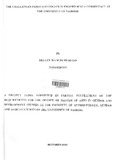| dc.description.abstract | This study examined the challenges female students in engineering courses face at the University of Nairobi. Central to the study was the analysis of the factors that motivate female students to select engineering as their area of study, the issues that affect female students ip their studies and their suggestions on what should be done to enhance their academic performance. Both primary and secondary data were collected using survey and interview methods in September, 2012.
A survey was conducted at the School of Engineering, University of Nairobi with thirty female students as respondents. There is a large disparity in the ratio of men to women studying Science, Engineering and Technology courses in public universities in Kenya generally. There are many efforts taken by the Government of Kenya, the universities and other stakeholders to increase the number of women in these sectors and though these efforts are yielding fruits the change is slow. The study was guided by the Gender and Development theory.
The study found that there has been an upward trend in the number of female students enrolled in engineering courses at the University of Nairobi and their academic performance was good. The findings reveal that most the challenges female students in engineering are similar in several respects to those faced by male students. The study further revealed that most female engineering students selected the course because they attained good grades in their end of high school examinations, and because engineering is a prestigious and well-paying career. The findings also indicate that many female students find engineering studies demanding because of its heavy workload and inadequate learning facilities.
The study further revealed that availing better learning material and improving facilities overall would go a long way to improve the learning environment and performance of female students. Most of the challenges reported by female students during this study were not gender-specific. The female students said they had not been victims of sexual harassment. The study concludes that the main problems female students face are not unique to them as women but are experienced by male students too. The study recommends that continuous implementation of affirmative action in admissions should be adopted and the learning facilities and resources at the university should be improved to enhance the educational experience of students. | en_US |

